|
Cambodia has some of the most spectacular temples anywhere in the
world, and this alone makes it a very popular tourist destination.
Add to that extremely cheap prices for just about anything, and a
good climate and you could be looking at the next big thing. If the
country can stay at peace and if the government can maintain
stability that is. There are over two thousand temples in Cambodia,
and many more now officially in other neighbouring countries that
were built on Cambodian soil many years ago. You could probably
spend six months seeing these temples, but with limited time, we saw
four of the best, all conveniently located within an hour of Siem
Reap, where we were staying.
Unless you want to spend months researching where you are going to
go, the best way to see and learn about the temples is to take the
services of one of the local guides. As said before, we had some
great recommendations, and Mr Vannak, our guide, was excellent. A
local with a real interest in the history of his country, he was
able to tell us stories you will never find in your Lonely Planet
guide. More details on Mr Vannak later on.
Final word before you start to look below at the pictures.... they
are quite large in filesize, so they may take a while to load, but I
do hope they are worth the wait.
|
|
| |
|
| Angkor Thom -
Bayon Temple (1190) |
|
|
Angkor Thom means "Great City" and houses many different temples,
some large and some small. We entered through the Southern gate,
across a causeway that originally crossed a moat, which surrounded
the city. As you can see from the picture below, the moat is now
almost dried up. The statues that lined either side of the causeway
had mostly had their heads stolen at some time during the countries
turbulent past. To prevent further looting, the authorities removed
the remaining heads for safekeeping and replaced them with cement
replicas. This replacement is evident by the different shade of body
and head you can see.
|
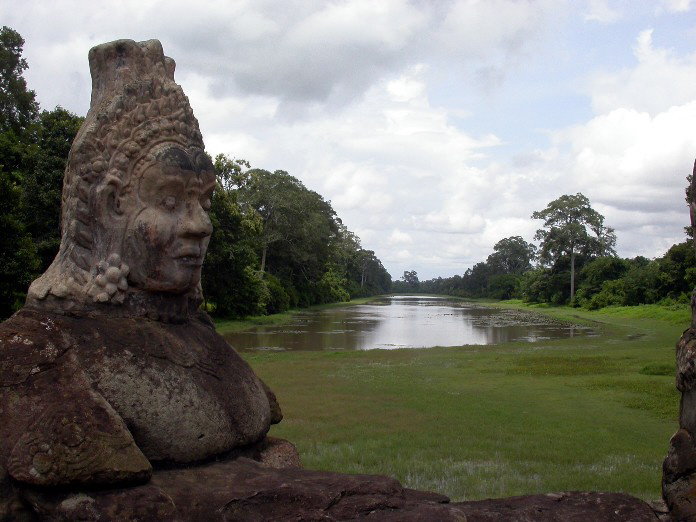 |
| |
|
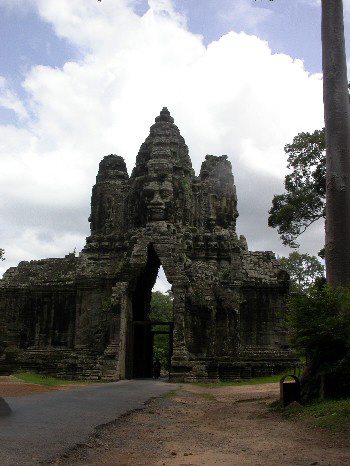 |
The view from inside the South Gate. The four smiling faces on the
gate are a prelude to the style of the Bayon temple, which has a
staggering 216 such faces on its towers. |
| |
|
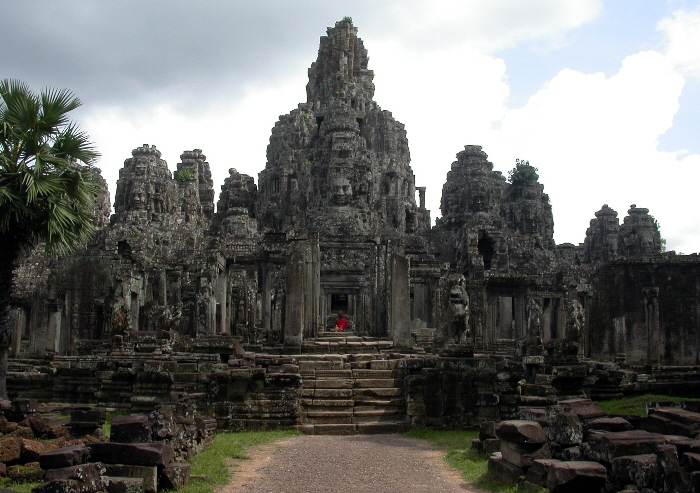 |
|
The Bayon Temple, viewed from the East. What looks like simply piles
of rubble becomes superbly detailed stonework as you get closer. |
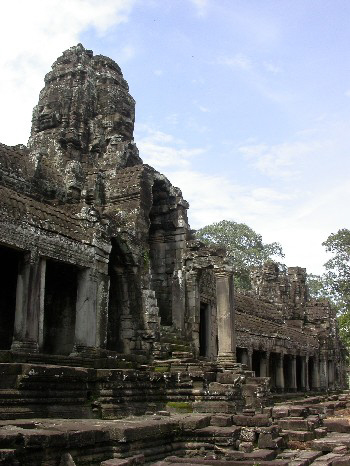 |
Inside the temple walls |
| There
was always perfect symmetry with the temples. However, after 900
years, things do start to get a little crooked ! |
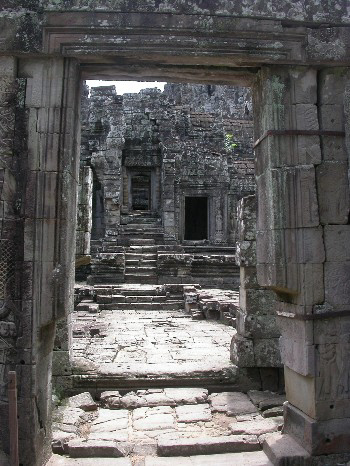 |
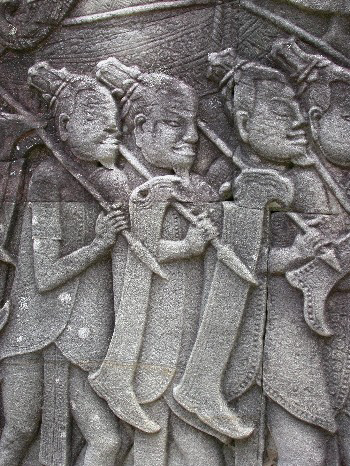 |
A
very small sample of the amazing stonework in Bayon. This is where a
good guide makes all the difference. We were told the stories of
each scene, and the key characters were also pointed out. These
gentlemen on the left being Chinamen about to wage war with the
Khmer. |
| The
whole atmosphere of Bayon was one of peace and tranquility. You
can't help but feel like that with the smiling faces watching over
you ! |
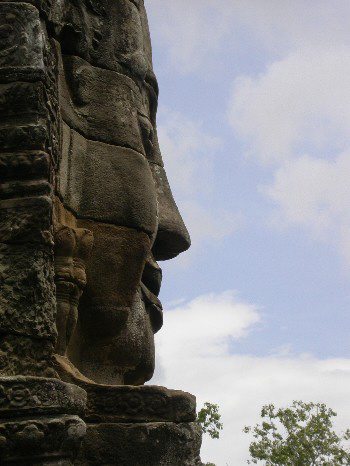 |
| |
|
|
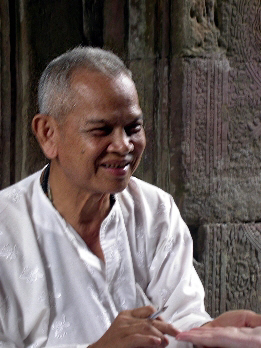 |
In
the middle of the temple we came across a fortune teller who spoke
French, and various Cambodian tongues, but very little English. Thankfully, Mr Vannak managed to translate for Vici. The outcome was that Vici
could be lazy, but also she studied hard and worked hard and was
very lucky, and would eventually become a millionaire !
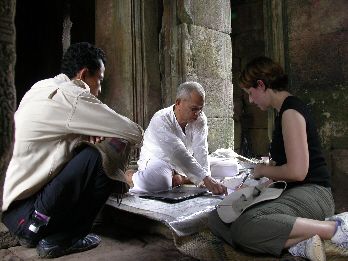
|
| |
|
|
The temple is still a holy place and is still used for worship, so
we also got to see some monks. These charming gents seemed to be
quite at home in front of the camera lens and were being
photographed front on by another visitor when I took this shot. |
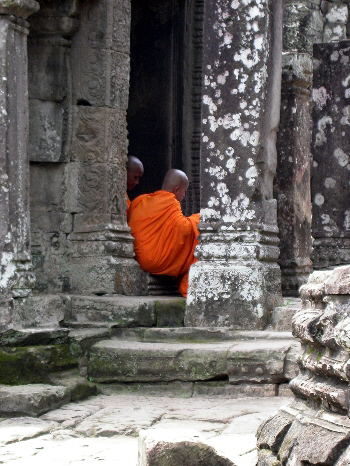 |
|
And as we left the Bayon temple, it became a pile of rubble again,
but of course we now knew the secret of the 216 smiling faces. |
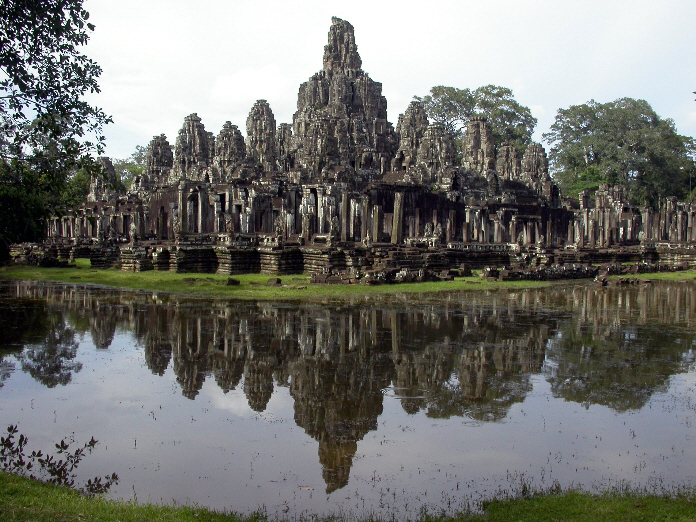 |
| |
|
|
| |
|
| Angkor Wat
(1113 - 1150) |
|
|
Angkor Wat is the largest temple of all and covers an impressive
1500 square meters. Reached by a huge causeway which crosses the
protective moat, you enter through the outer gates to find the five
towers rising above you. Unfortunately, everyone else knows it is
the largest and most popular temple, so in stark contrast to the
serenity and peacefulness we had experienced at the Bayon temple we
had just left, we "enjoyed" Angkor Wat with about 5000 other people.
Remember this is off season. Apparently in the peak of tourist
season, which runs November to January, there is sometimes a total
people gridlock across the causeway.
|
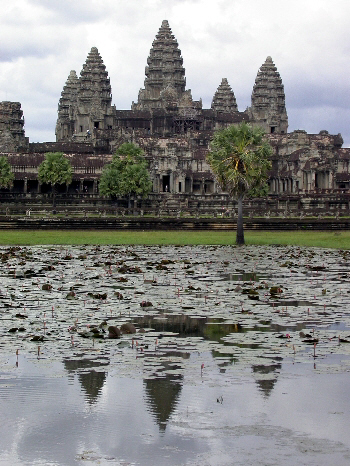 |
It
is impressive just by its sheer size and mass, but it was not as
intimate as the Bayon temple, which will probably remain our
favourite. |
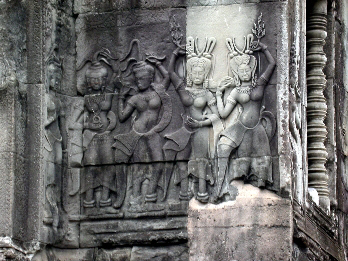 |
It's amazing how quickly you can erase Japanese tourists in
PhotoShop ! |
|
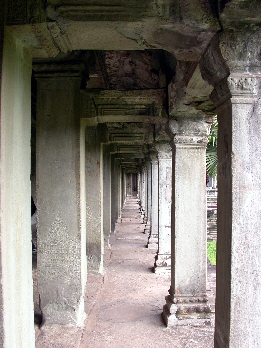 |
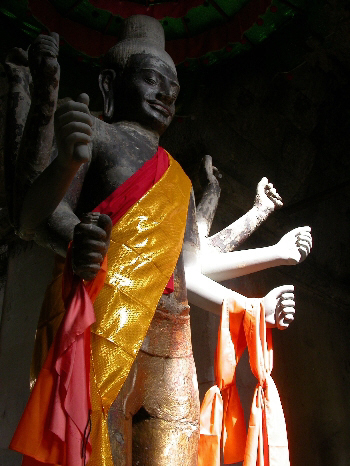 |
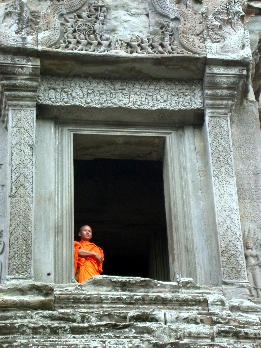 |
| |
|
|
You
are constantly reminded that this is a holy place...
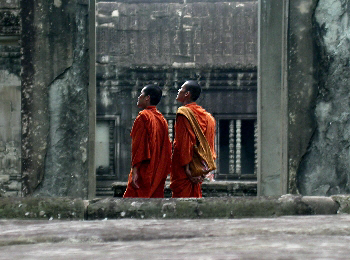 |
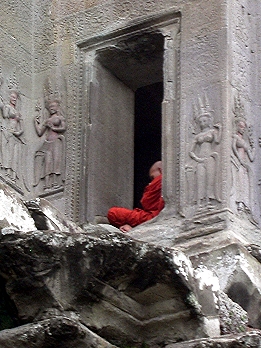 |
| |
|
|
I'm glad we can say we've seen Angkor Wat and I'm sure it will
remain a firm favourite for years to come. Just make sure it's not
the only temple you see. |
| |
|
|
|
Banteay Srey : The Citadel of Women (967)
|
|
|
Banteay Srey lies about 40km North East of Siem Reap. Due to the
poor condition of the roads, and the huge variety of obstacles we
had to face, this was a one hour drive. But totally worth it. On the
way there we got a chance to see the real Cambodia. To be honest, it
was quite saddening to see where the people were living. That said,
you could also see the hope that existed. Every house we passed was
busy and bustling, with something going on, and some wares for sale
on the small stall by the roadside. We saw everything from sugarcane
juice to car batteries on offer. We were glad to spend quiet time in
another peaceful temple after the chaos of Angkor Wat.
|
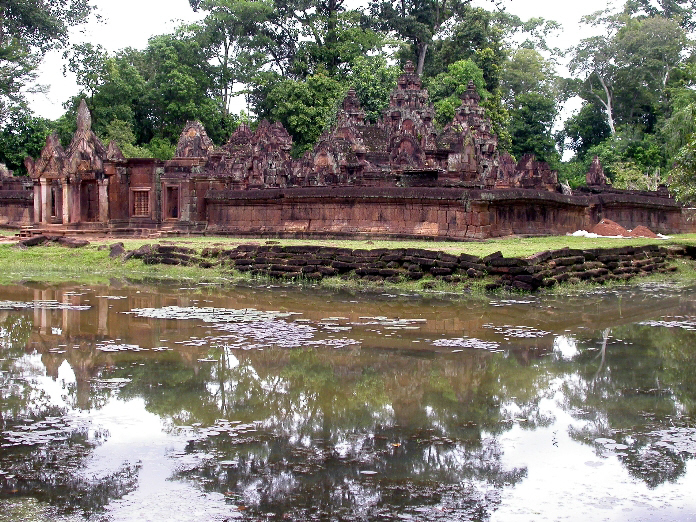 |
| |
|
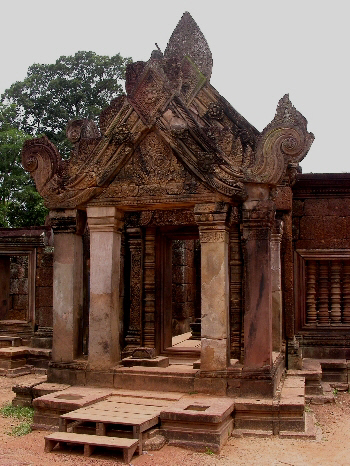 |
Do
not adjust your sets. Banteay Temple is actually red, infact made
from a very unusual red sandstone, which was quarried not far from
the site. The name "Citadel of Women" was given to the temple due to
the ornate, intricate carvings, which is was said could not have
come from the coarse hand of man ! |
|
One of the temple caretakers takes a break from the sun. |
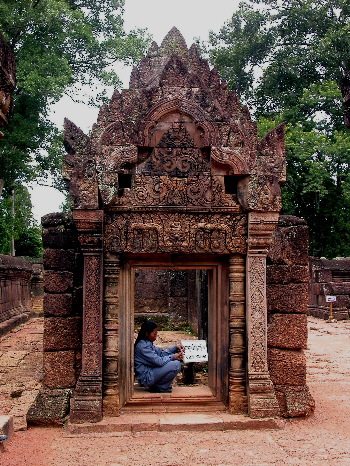 |
| |
|
|
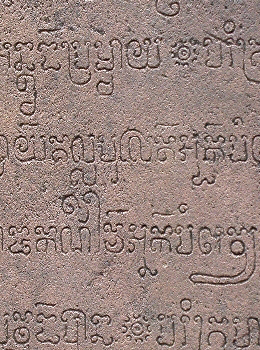
|
Some of the carvings. Sanscript on the left, and fighting monkey
kings below. |
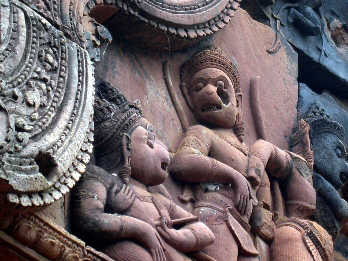 |
|
| Ta
Prohm (1186)
|
|
|
Amazingly, most of the temples that can be visited today were only
"rediscovered" in the early 1900's. Most were in a sorry state,
having been at the mercy of looters and also the forces of nature,
as the jungles tried to take back the land that was rightfully
theres in the first place. Many different countries have helped in
the restoration of the temples over the years. We saw sites being
restored by French, Swiss, Japanese and even the Italians (of course
that site was only half finished before everyone left on strike, but
what do you expect ?!) The restoration work usually starts with
clearing the site of the jungle, then rebuilding the damage that has
been caused by nature. Ta Prohm is unique in that it has been
cleared only enough to allow safe access. Everything else you see is
exactly as it would have been when it was unearthed almost 100 years
ago. A full 800 years after it was built.
|
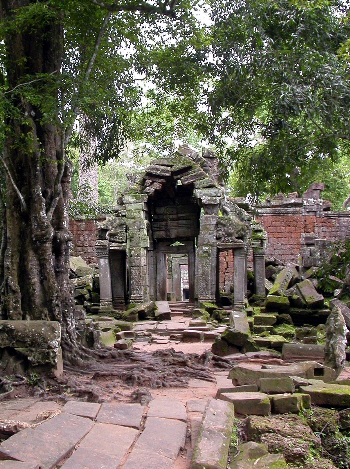 |
The entrance is barely standing. The causeway buckled and twisted by
the huge tree that now rises from the forest floor. |
| |
|
It almost looks OK from
here. Just wait to you see the inside.... |
| |
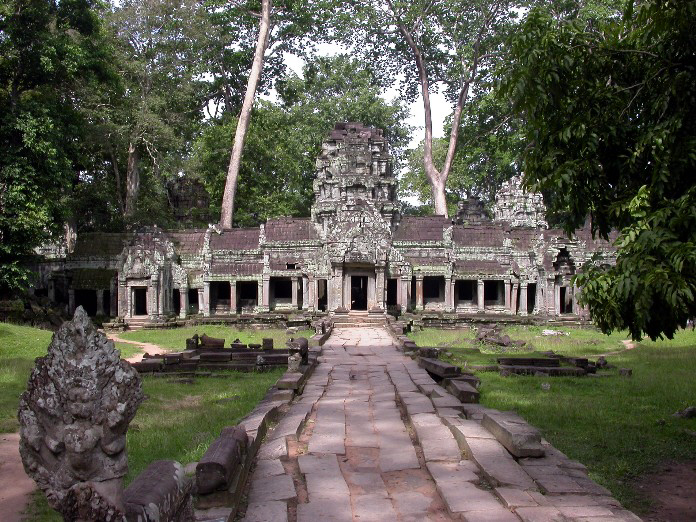 |
| |
|
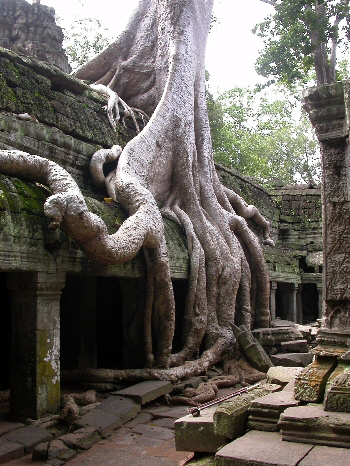 |
The power struggle between earth, bricks and nature rages silently
inside the temple walls. |
|
A
tree within a tree. The first tree had taken hold of the temple
walls before dying out, only to be replaced by a younger tree which
wrapped itself around the first tree, creating this amazing arterial
effect. (Pity some tourists got in the way of the picture, ah
well....) |
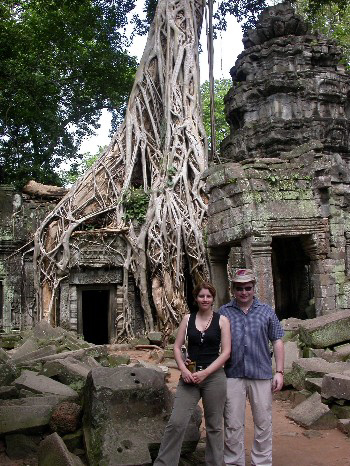 |
| |
|
The dense tree cover
created a quite eerie feeling, with very little light penetrating
inside the collapsed walkways and corridors. |
| |
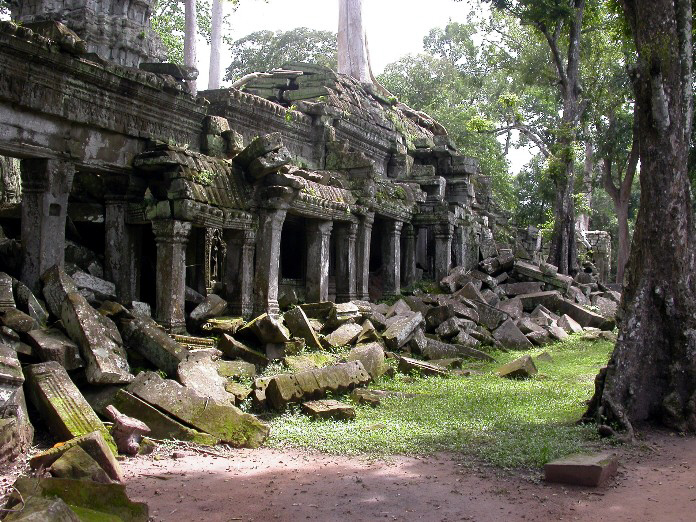 |
|
The battle creeps
silently on at Ta Prohm, and from the picture below, it looks like
nature is winning.
|
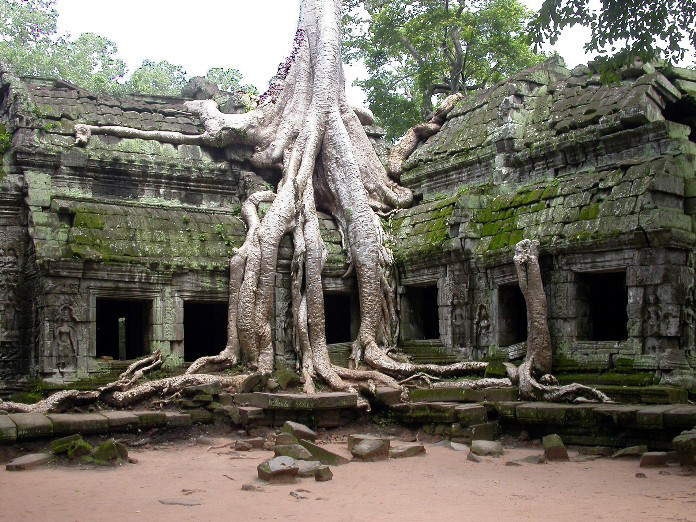 |
| |
|
If you're feeling
adventurous, you have a broadband connection and windows media
player, click here |
|
|
Travel tips
We had a great weekend,
and hope many more people get to see these amazing temples. We also
hope Cambodia stays at peace, so its people can succeed to prosper.
Flights :
SilkAir
Hotel :
Angkor Hotel
or
Angkor Star Hotel
Tour Guide :
Mr
Vannak (A huge thank you required
here. Excellent service) |